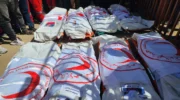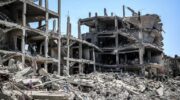The BBC is the most-visited news site on the internet today, and calls itself “the world’s most trusted international news provider.” But can we count on it to tell the truth? Not when Israel is involved, Owen Jones reports.
by Kathryn Shihadah
The BBC is facing an internal revolt over its reporting on Israel’s war on Gaza. The struggle has gone public with a deep dive by Owen Jones on Drop Site News.
“The primary battlefield,” Jones writes, “has become the online news operation,” where a conspicuous pro-Israel bias has been evident, especially since October of 2023 when the Hamas resistance group broke through the border with Israel and attacked several locations.
Over a dozen current and former BBC journalists have tried again and again to engage their management to offer critique on reporting on the subsequent war, and to demand policy changes – to no avail.
Those who spoke to Drop Site News contend that “the imbalance is structural, and has been enforced by the top brass for many years.” They requested anonymity out of concern for their careers.
When their efforts were ignored, over 250 journalism industry professionals – 100 of them BBC employees – signed a public letter criticizing media outlets, especially the BBC, for betraying the public trust in their failure to cover the war in Gaza with integrity. The letter asserted that “[b]asic journalistic tenets have been lacking when it comes to holding Israel to account for its actions.”
The letter also called on the BBC to make a series of specific changes in its coverage, including reminding readers that Israel does not give external journalists access to Gaza, making it clear to readers when Israel does not provide sufficient evidence to back up its claims, and other demands that in any other journalistic context would be routine.
Staffers at BBC were also critical about the network’s apparent suppression of the latest Amnesty International report, which concluded (like other major human rights groups) that Israel is committing genocide in Gaza.
One BBC Arabic correspondent, Rami Ruhayhem, pointed out the network’s selective use of words like “massacre,” “slaughter,” and “atrocities” when referring to actions by Hamas, but generally not when describing Israeli military operations.
In a similar vein, while BBC reporting tends to defer to vocabulary used by experts, that is not the case in stories about Israel. For example, words like “apartheid” and “ethnic cleansing,” embraced by the human rights community overall, tend to be shunned by the network.
In short,
an unprecedented analysis of more than 2,900 stories and links on the BBC news website in the year following October 7, 2023 reveals a profound imbalance in how the organization has reported Palestinian and Israeli deaths.
Owen Jones’ article offers many examples of BBC headlines in which writers managed to conceal Israel’s wrongdoings – even war crimes. For example, a story about a civilian man in Gaza whose four young children and seven other family members were massacred by an Israeli bomb, is entitled, “Israel Gaza: Father loses 11 family members in one blast.” The entire article manages to not mention the word “Israel” again, as the perpetrator of the incident or in any other context.
More egregious, BBC coverage avoided quotes by Israeli leaders that suggest genocidal intent, though these played a prominent role in South Africa’s case against Israel in the International Court of Justice.
In contrast, BBC coverage plainly classified actions by Russia against Ukraine as “war crimes,” even without court rulings (more on comparisons of language in Russia/Ukraine vs Israel/Palestine here).
Owen Jones’ analysis goes far beyond these transgressions, providing example after example of the BBC’s deference to the Israeli narrative, an in-depth scrutiny of the network’s word choices, and names of editors and senior management who have played an active role in suppressing the voices of Palestinians and their allies.
One journalist from the BBC summed up the matter: “Most people with a conscience here have found that the coverage is frankly despicable.”
The same could be said about US mainstream media (see reading list below).
Readers in the US and around the world need and deserve to know the truth.
If Americans Knew tells the truth – you can count on it. Please subscribe, share, and support our work.
Kathryn Shihadah is an editor and staff writer for If Americans Knew.
FURTHER READING ON PRO-ISRAEL MEDIA BIAS:
- NY Times killed investigation of Israeli hooligans in Amsterdam, internal email revealed
- A year late, the Guardian finally permits us to use the term ‘genocide’
- U.S. Media’s Doublespeak: Israelis Live in “Densely Populated Areas,” Palestinians Are “Human Shields”
- ‘Words like Slaughter:’ A comparative study of The New York Times reporting in Ukraine and Gaza
- More dead children. More BBC ‘news’ channelling Israeli propaganda as its own
- U.S. media downplays and ignores ICJ ruling declaring Israeli occupation illegal
- When Israel Burned Refugees Alive, Establishment Media Called It a ‘Tragic Accident’
- Why the news media’s job is to groom us




